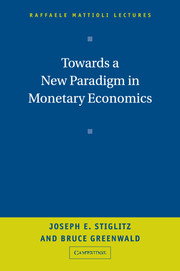Book contents
- Frontmatter
- Contents
- List of figures and table
- The Raffaele Mattioli Lectures
- Preface
- Part I The principles of the new paradigm
- Part II Applications of the new paradigm
- 8 Monetary policy
- 9 Regulatory policy and the new paradigm
- 10 Financial market liberalization
- 11 Restructuring the banking sector
- 12 Regional downturns and development and monetary policy
- 13 The East Asia crisis
- 14 The 1991 US recession and the recovery
- 15 The new paradigm and the “new economy”
- 16 Concluding remarks
- Bibliography
- Index
15 - The new paradigm and the “new economy”
Published online by Cambridge University Press: 12 May 2010
- Frontmatter
- Contents
- List of figures and table
- The Raffaele Mattioli Lectures
- Preface
- Part I The principles of the new paradigm
- Part II Applications of the new paradigm
- 8 Monetary policy
- 9 Regulatory policy and the new paradigm
- 10 Financial market liberalization
- 11 Restructuring the banking sector
- 12 Regional downturns and development and monetary policy
- 13 The East Asia crisis
- 14 The 1991 US recession and the recovery
- 15 The new paradigm and the “new economy”
- 16 Concluding remarks
- Bibliography
- Index
Summary
Much has been written in recent years about the “new economy,” the changes in technology, and the pace of technological change. The new economy has also been marked by globalization, a closer integration of capital, labor, and product markets, a freer flow of ideas and knowledge, as a result of technological innovations which have reduced transportation and communication costs as well as of changes in global policies which have brought down man–made barriers. These changes have had an impact on the overall structure of the economy and on macro–economic performance. While the downturn that set in in the United States in late 2000 demonstrated that even the new economy could be subjected to fluctuations (at least in the pace of economic growth), it does appear that economic expansions (at least in the United States) are markedly longer than was previously the case. Similarly, downturns since the Second World War are far shorter than they were previously.
The credit paradigm helps us focus on the consequences of these changes in the economy, and leads to markedly different predictions concerning, for instance, the future efficacy of monetary policy than those that might be derived from the transactionsbased approach. Changes in the financial sector have played a pivotal role in the new economy – the financial sector has been among the sectors which have been most changed, and it has, at the same time, induced the most change in the overall performance of the economy.
- Type
- Chapter
- Information
- Towards a New Paradigm in Monetary Economics , pp. 284 - 292Publisher: Cambridge University PressPrint publication year: 2003

